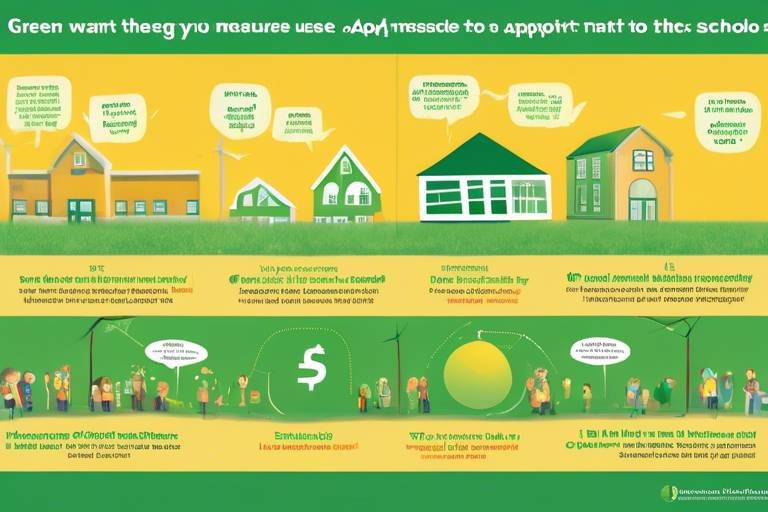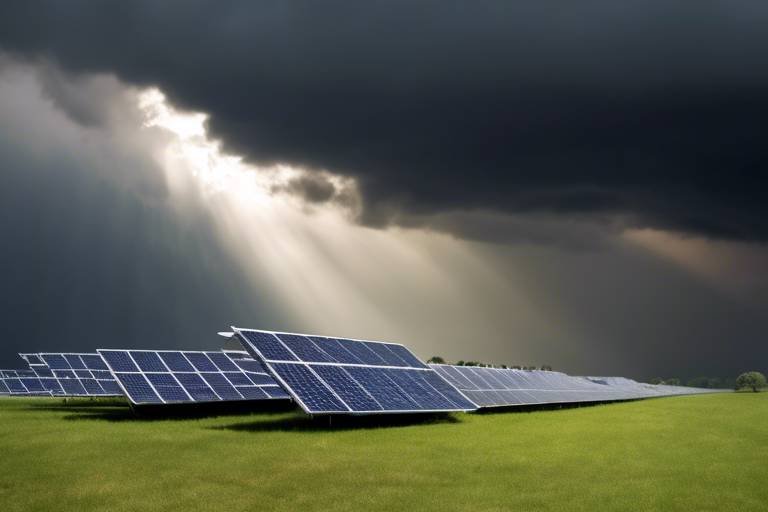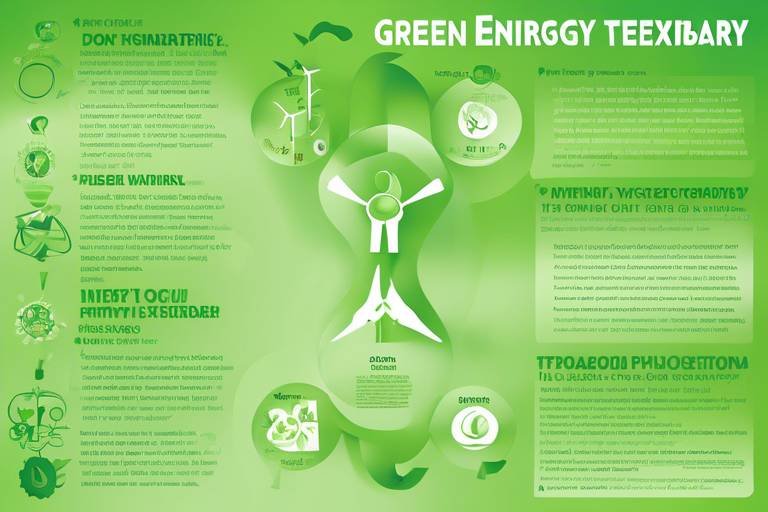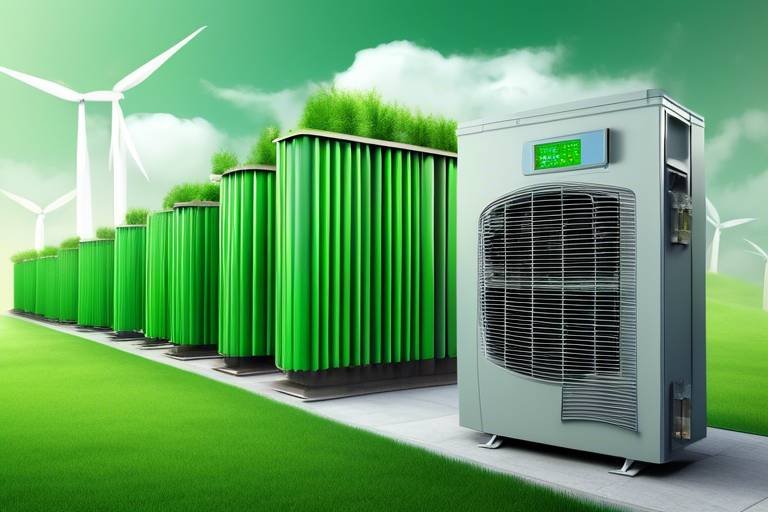How Does Green Energy Benefit Small Businesses?
In today’s fast-paced world, the concept of green energy has become more than just a buzzword; it’s a vital aspect of modern business strategy. Small businesses, in particular, stand to gain immensely from adopting renewable energy solutions. Imagine slashing your monthly utility bills while simultaneously doing your part to save the planet. Sounds like a win-win, right? This article dives into the myriad of benefits that green energy offers to small businesses, from cost savings to an enhanced brand reputation, and how these advantages can lead to long-term success.
Transitioning to renewable energy sources can significantly reduce operational costs for small businesses over time, leading to increased profitability and financial stability. Think about it: when you harness energy from the sun or wind, you’re tapping into free resources that can drastically lower your energy bills. For many small business owners, this can mean the difference between thriving and merely surviving. Not only does this shift reduce costs, but it also shields businesses from the volatility of traditional energy prices. In fact, a recent study showed that small businesses that adopt renewable energy can save up to 30% on their energy costs over a decade.
Utilizing green energy helps small businesses minimize their carbon footprint, contributing to a healthier planet and promoting sustainable practices within their communities. By making the switch, businesses can actively participate in the global movement towards sustainability. The positive environmental impact is twofold: it not only helps the planet but also enhances the business's appeal among consumers who prioritize eco-friendly practices. This shift can lead to a stronger connection with the community and a loyal customer base.
By switching to renewable energy, small businesses can effectively lower their carbon emissions, aligning with global efforts to combat climate change and environmental degradation. The statistics are staggering: businesses that transition to green energy can reduce their carbon emissions by as much as 50% or more. This commitment to sustainability resonates with consumers who are increasingly aware of their environmental impact and prefer to support businesses that share their values.
Investing in sustainable energy solutions ensures that small businesses can thrive in the long run while supporting ecological balance and resource conservation. Just like planting a seed today for a bountiful harvest tomorrow, small businesses that invest in green energy today are setting themselves up for future success. This forward-thinking approach not only benefits the business but also contributes to a more sustainable economy overall.
Green energy initiatives often involve local resources, which helps protect and preserve nearby ecosystems, promoting biodiversity and community well-being. When small businesses invest in local renewable energy projects, they are not only reducing their carbon footprint but also supporting local economies. This creates a ripple effect of positive change, as healthier ecosystems lead to a more vibrant community. It's a beautiful cycle of giving back, one that can enhance a business's reputation and foster community loyalty.
Adopting green energy technologies allows small businesses to reduce reliance on traditional energy sources, enhancing their energy independence and security. Imagine the peace of mind that comes with knowing your energy needs are met by sustainable sources rather than fluctuating fossil fuel prices. This independence not only stabilizes operating costs but also positions small businesses as leaders in the transition to a greener economy.
Embracing green energy can improve a small business's public image, attracting eco-conscious customers and fostering loyalty through responsible practices. In an age where consumers are more informed and concerned about their choices, businesses that prioritize sustainability can stand out in a crowded marketplace. This shift not only attracts new customers but also builds a loyal customer base that appreciates the commitment to protecting the planet.
As consumers increasingly prioritize sustainability, businesses that adopt green energy can differentiate themselves and appeal to environmentally aware customers. It’s no longer just about the product; it’s about the story behind it. Customers want to support brands that align with their values, and by showcasing your commitment to green energy, you can attract a demographic that is eager to spend on sustainable options.
Demonstrating a commitment to green energy fosters trust within the community, encouraging collaboration and support from local stakeholders and customers alike. When a small business takes steps to reduce its environmental impact, it sends a strong message: "We care about our community and the world we live in." This commitment to sustainability can lead to partnerships with other local businesses and organizations, further enhancing the brand's reputation and reach.
- What are the initial costs of switching to green energy? While the initial investment can be significant, many small businesses find that the long-term savings far outweigh these costs.
- How can I find local renewable energy providers? Research local energy companies or government programs that offer incentives for switching to renewable sources.
- What types of renewable energy are best for small businesses? Solar and wind energy are popular options, but the best choice depends on your location and specific needs.

Cost Savings through Renewable Energy
Transitioning to renewable energy sources can significantly reduce operational costs for small businesses over time, leading to increased profitability and financial stability. Imagine running your business with lower energy bills—sounds appealing, right? By harnessing the power of the sun, wind, or even geothermal energy, small businesses can cut their reliance on expensive fossil fuels. This not only helps the bottom line but also provides a hedge against the unpredictable fluctuations in energy prices.
One of the most compelling reasons to consider green energy is the potential for substantial cost savings. For instance, businesses that invest in solar panels can often see their energy bills drop by as much as 50% or more. This translates to thousands of dollars saved each year. Additionally, many governments offer incentives and tax credits for businesses that invest in renewable energy technologies, making the transition even more financially viable.
| Type of Renewable Energy | Potential Savings | Incentives Available |
|---|---|---|
| Solar Energy | Up to 50% reduction in energy costs | Tax credits, grants |
| Wind Energy | 30% reduction in energy costs | Investment tax credits |
| Geothermal Energy | 25% reduction in energy costs | State rebates |
Moreover, renewable energy systems often come with low maintenance costs. Once installed, systems like solar panels have minimal upkeep, which means fewer unexpected expenses. This reliability can be a game changer for small businesses that need to manage cash flow effectively. By shifting to renewable sources, you're not just saving money; you're also investing in a sustainable future that can provide long-term financial benefits.
Another factor to consider is the impact on employee morale. When employees know they are part of a company that prioritizes sustainability, it can foster a sense of pride and loyalty. Happy employees often lead to increased productivity, which can further enhance the financial health of a small business. It's a win-win situation—lower costs, happier employees, and a positive impact on the environment.
In conclusion, the switch to renewable energy is not just a trend; it's a smart business move. With the potential for significant cost savings, reduced operational risks, and improved employee morale, small businesses have much to gain from embracing green energy solutions. Why not take the leap and start reaping the benefits today?
- What are the initial costs of switching to renewable energy?
While initial costs can vary, many businesses find that the long-term savings outweigh these expenses, especially with available incentives. - How long does it take to see savings from renewable energy?
Many businesses start seeing savings within the first year of installation, depending on the type of renewable energy used. - Are there any government incentives for adopting renewable energy?
Yes, many governments offer tax credits, grants, and rebates to encourage businesses to invest in renewable energy technologies.

Environmental Impact of Green Energy
This article explores the various advantages of adopting green energy solutions for small businesses, including cost savings, environmental impact, and enhanced brand reputation.
Transitioning to renewable energy sources can significantly reduce operational costs for small businesses over time, leading to increased profitability and financial stability.
Utilizing green energy helps small businesses minimize their carbon footprint, contributing to a healthier planet and promoting sustainable practices within their communities. By harnessing renewable sources like solar, wind, and hydro, businesses can play a crucial role in the fight against climate change. The transition to green energy not only benefits the environment but also enhances the overall sustainability of the business itself.
By switching to renewable energy, small businesses can effectively lower their carbon emissions, aligning with global efforts to combat climate change and environmental degradation. For instance, a small café that installs solar panels can drastically cut down its reliance on fossil fuels, which not only reduces its operational costs but also contributes to cleaner air and a healthier environment. This move not only demonstrates responsibility but also inspires other local businesses to follow suit.
Investing in sustainable energy solutions ensures that small businesses can thrive in the long run while supporting ecological balance and resource conservation. It's like planting a tree; the more you nurture it, the more shade it provides in the future. Businesses that embrace green energy today are essentially laying the groundwork for a more sustainable tomorrow, both for themselves and for future generations.
Green energy initiatives often involve local resources, which helps protect and preserve nearby ecosystems, promoting biodiversity and community well-being. For example, a small manufacturing firm that utilizes locally sourced biomass for energy not only reduces transportation emissions but also supports local agriculture. This symbiotic relationship fosters a thriving community where businesses and the environment can coexist harmoniously.
Adopting green energy technologies allows small businesses to reduce reliance on traditional energy sources, enhancing their energy independence and security. Imagine waking up every day knowing that your energy supply is not subject to the whims of fluctuating fossil fuel prices. This independence can lead to more predictable budgeting and financial planning, allowing small businesses to allocate resources more efficiently.
Embracing green energy can improve a small business's public image, attracting eco-conscious customers and fostering loyalty through responsible practices.
As consumers increasingly prioritize sustainability, businesses that adopt green energy can differentiate themselves and appeal to environmentally aware customers. In a world where consumers are bombarded with choices, being a green business can be your secret weapon. It’s like having a badge of honor that says, "We care about the planet!" This not only attracts new customers but also builds a community of loyal patrons who appreciate your commitment to sustainability.
Demonstrating a commitment to green energy fosters trust within the community, encouraging collaboration and support from local stakeholders and customers alike. When a business takes steps to reduce its environmental impact, it sends a powerful message that it values the community it serves. This trust can translate into increased customer loyalty, positive word-of-mouth, and even partnerships with other local businesses and organizations.
- What are the main benefits of green energy for small businesses? Green energy offers cost savings, environmental benefits, and enhanced brand reputation, which can lead to increased customer loyalty.
- How can small businesses transition to renewable energy? Small businesses can start by conducting an energy audit, exploring available incentives, and investing in renewable energy technologies like solar panels or wind turbines.
- Are there financial incentives for adopting green energy? Yes, many governments offer tax credits, grants, and other financial incentives to encourage businesses to invest in renewable energy solutions.
- How does green energy impact the local community? Green energy initiatives can create jobs, support local economies, and contribute to healthier ecosystems, fostering a sense of community well-being.

Reducing Carbon Emissions
Switching to renewable energy sources is not just a trend; it's a powerful movement that small businesses can join to make a significant impact on our planet. By embracing green energy, these businesses can effectively lower their carbon emissions, which is crucial in the global fight against climate change. Imagine a world where every small business contributes to a cleaner, healthier environment—this is not just a dream; it's an achievable reality!
When small businesses take the leap into renewable energy, they are not only reducing their own carbon footprint but also inspiring others in their communities to follow suit. This ripple effect can lead to a collective reduction in greenhouse gases, which is essential for combating the adverse effects of climate change. For instance, studies show that businesses that shift to solar or wind energy can significantly cut their carbon emissions by up to 80% compared to those relying on fossil fuels.
Furthermore, the transition to green energy can be likened to planting a tree. Just as a tree absorbs carbon dioxide and releases oxygen, small businesses that adopt renewable energy practices are actively participating in the restoration of our atmosphere. They are not only reducing emissions but also nurturing a sustainable future for generations to come.
Here are some of the key ways small businesses can reduce carbon emissions:
- Solar Panels: Installing solar panels can drastically lower reliance on fossil fuels, leading to a cleaner energy source.
- Energy Efficiency: Upgrading to energy-efficient appliances and lighting can significantly decrease energy consumption.
- Green Transportation: Encouraging the use of electric vehicles or promoting public transport for employees can further cut down emissions.
By implementing these strategies, small businesses not only contribute to a healthier planet but also position themselves as leaders in sustainability. This proactive approach can lead to long-term benefits, including potential tax incentives and grants aimed at supporting green initiatives. Moreover, as consumers become more environmentally conscious, they are likely to favor businesses that demonstrate a commitment to reducing their carbon emissions. In essence, adopting renewable energy is a win-win situation—good for the planet and good for business!
Q: What are the most effective renewable energy sources for small businesses?
A: Solar energy and wind energy are among the most effective and accessible renewable sources for small businesses. They can significantly reduce energy costs and carbon emissions.
Q: How can small businesses measure their carbon footprint?
A: Businesses can measure their carbon footprint by assessing their energy consumption, waste production, and transportation methods. There are various online calculators available to help with this process.
Q: Are there any financial incentives for adopting green energy?
A: Yes! Many governments offer tax credits, grants, and rebates for businesses that invest in renewable energy solutions. It's worth researching local and federal programs to maximize savings.

Long-Term Sustainability
Investing in sustainable energy solutions is not just a trend; it’s a vital strategy for small businesses aiming for . By adopting green energy practices, businesses can ensure that they not only survive but thrive in an ever-evolving marketplace. Imagine a small café that decides to install solar panels. Initially, the investment might seem daunting, but over time, the savings on energy bills can be substantial, allowing the café to reinvest in other areas, like quality ingredients or community events.
Moreover, sustainable energy practices can lead to greater resilience against fluctuating energy prices. Traditional energy sources can be unpredictable, with prices rising and falling based on market conditions. However, renewable energy sources, such as solar or wind, provide a more stable and predictable cost structure. This stability can help small businesses plan their budgets more effectively, leading to better financial health and less anxiety about unexpected expenses.
Another important aspect of long-term sustainability is the environmental responsibility that comes with adopting green energy solutions. Small businesses that prioritize sustainability contribute to a healthier planet, which is increasingly important to consumers. In fact, studies show that a significant percentage of customers are willing to pay more for products and services from eco-friendly businesses. This shift in consumer behavior means that adopting sustainable practices can lead not only to cost savings but also to increased sales and customer loyalty.
Additionally, sustainable energy practices can enhance a business's reputation within the community. When a small business takes steps to minimize its environmental impact, it sends a message that it cares about the future of the planet and the well-being of its community. This can foster a sense of trust and loyalty among customers, who are more likely to support businesses that align with their values. In essence, being a responsible steward of the environment can be a powerful marketing tool.
To illustrate the benefits of long-term sustainability in small businesses, consider the following table:
| Benefit | Description |
|---|---|
| Cost Savings | Reduced energy bills and predictable pricing. |
| Environmental Impact | Lower carbon emissions and a healthier planet. |
| Community Trust | Building a loyal customer base through responsible practices. |
| Market Differentiation | Standing out in a competitive market by showcasing sustainability. |
In conclusion, the journey toward long-term sustainability is not just beneficial; it’s essential for small businesses looking to secure their future. By embracing green energy solutions, businesses can enjoy a multitude of advantages that go beyond mere financial savings. They can become leaders in their communities, inspire others to follow suit, and contribute to a more sustainable world for generations to come.
- What are the initial costs of switching to green energy? While the upfront costs can be significant, many businesses find that the long-term savings on energy bills and potential tax incentives make it worthwhile.
- How can small businesses find financial assistance for green energy projects? Many local and federal programs offer grants and loans for businesses looking to invest in renewable energy solutions.
- Is green energy reliable? Yes! With advancements in technology, renewable energy sources like solar and wind have become increasingly reliable and efficient.
- Can green energy solutions be implemented in any business? Absolutely! From cafes to retail stores, any business can benefit from adopting sustainable practices.

Supporting Local Ecosystems
When small businesses embrace green energy solutions, they don’t just benefit their bottom line; they also play a crucial role in . This is like planting a seed that grows into a tree, providing shade and shelter for countless creatures. By utilizing renewable energy sources such as solar and wind, businesses can significantly reduce their reliance on fossil fuels, which are notorious for their damaging effects on the environment. This transition not only helps in lowering greenhouse gas emissions but also contributes to the preservation of local wildlife habitats.
Consider this: every time a small business opts for solar panels instead of traditional energy sources, it’s a step towards protecting local flora and fauna. These renewable energy initiatives often harness local resources, such as sunlight and wind, which means that the energy produced is not only sustainable but also in harmony with the surrounding environment. This local approach helps maintain the balance of ecosystems, ensuring that plants and animals can thrive without the disruption often caused by industrial energy extraction.
Moreover, by investing in green energy, small businesses can actively participate in the conservation of biodiversity. For example, many renewable energy projects incorporate environmental assessments that consider the impact on local species and habitats. This proactive stance is essential for fostering a healthy ecosystem. It's akin to being a good neighbor—when businesses take steps to minimize their ecological footprint, they contribute to a cleaner, healthier community for everyone.
In addition, supporting local ecosystems through green energy can also create opportunities for collaboration with other businesses and organizations focused on sustainability. When small businesses work together, they can amplify their impact, leading to community-wide initiatives that promote environmental stewardship. This collaborative spirit can manifest in various ways, such as community solar projects or local conservation efforts, which not only enhance the ecological landscape but also strengthen community ties.
In summary, by choosing green energy, small businesses are not just making a smart financial decision; they are also acting as stewards of the environment. They are helping to create a sustainable future where local ecosystems can flourish, ensuring that the natural beauty and biodiversity of their communities remain intact for generations to come. This commitment to environmental responsibility is like a ripple effect—small actions can lead to significant changes, fostering a culture of sustainability that benefits everyone.
- How does green energy impact local ecosystems? Green energy reduces reliance on fossil fuels, which helps protect local wildlife habitats and promotes biodiversity.
- Can small businesses collaborate on green energy initiatives? Absolutely! Collaboration can lead to community solar projects and other initiatives that enhance sustainability efforts.
- What are the financial benefits of supporting local ecosystems? Supporting local ecosystems through green energy can lead to long-term cost savings and improved brand reputation, attracting eco-conscious customers.
- How can small businesses measure their environmental impact? Businesses can conduct environmental assessments and track their carbon footprint to understand their impact and identify areas for improvement.

Energy Independence
In today's fast-paced world, small businesses are often at the mercy of fluctuating energy prices and supply uncertainties. However, adopting green energy technologies can empower these businesses to achieve a level of that was previously unimaginable. Imagine running your operations without the constant worry about rising electricity bills or supply chain disruptions! By harnessing renewable energy sources like solar and wind, small businesses can generate their own power, effectively insulating themselves from the volatility of traditional energy markets.
One of the primary benefits of energy independence is the predictability of costs. When you invest in renewable energy solutions, you often lock in your energy costs for years to come. This predictability allows for better financial planning and budgeting, which is crucial for small businesses aiming to thrive in competitive markets. Additionally, the initial investment in renewable energy can be offset by government incentives and tax breaks, making it a financially savvy choice.
Moreover, energy independence fosters a sense of security. Small businesses can operate with confidence, knowing they are less vulnerable to external factors like geopolitical tensions or natural disasters that can disrupt traditional energy supplies. For instance, during a storm or a power outage, businesses equipped with solar panels and battery storage can continue their operations, ensuring that they do not lose valuable time or revenue.
Furthermore, the shift towards renewable energy sources encourages innovation and growth within the local economy. As more businesses adopt green technologies, it creates a ripple effect, prompting the development of local green energy markets and job opportunities. This not only benefits the businesses themselves but also strengthens the community by creating a more resilient and sustainable economic environment.
In summary, the journey toward energy independence through green energy is not just a trend; it's a strategic move that can redefine the future of small businesses. By embracing renewable energy, these businesses not only secure their operational stability but also contribute to a more sustainable and eco-friendly world.
- What are the primary benefits of adopting green energy for small businesses?
Green energy offers numerous advantages, including cost savings, reduced carbon emissions, and enhanced brand reputation. - How can small businesses achieve energy independence?
By investing in renewable energy sources like solar panels or wind turbines, small businesses can generate their own power and reduce reliance on traditional energy sources. - What incentives are available for businesses transitioning to green energy?
Many governments offer tax credits, grants, and rebates to encourage the adoption of renewable energy technologies. - Is it expensive for small businesses to switch to renewable energy?
While there may be upfront costs, the long-term savings and potential incentives can make it a financially viable option.

Enhanced Brand Reputation
In today's competitive marketplace, small businesses are constantly seeking ways to stand out from the crowd. One of the most effective ways to achieve this is by embracing green energy. By adopting sustainable practices, businesses not only contribute to a healthier planet but also enhance their brand reputation significantly. Imagine walking into a store that proudly displays its commitment to the environment; it instantly creates a positive impression, doesn’t it? Customers are increasingly drawn to brands that reflect their values, and sustainability is at the forefront of these values.
When a small business switches to renewable energy sources, it sends a clear message: they care about the future. This commitment can be highlighted through various marketing strategies, such as showcasing energy-efficient practices in promotional materials or sharing success stories on social media. By doing so, businesses can effectively communicate their dedication to sustainability, attracting a loyal customer base that appreciates responsible practices.
Furthermore, being eco-friendly can lead to increased customer loyalty. Customers are more likely to return to a business that aligns with their values, and word-of-mouth recommendations from satisfied, environmentally-conscious customers can be incredibly powerful. A recent survey indicated that over 70% of consumers are willing to pay more for products and services from companies committed to positive social and environmental impact. This statistic underscores the importance of integrating green energy into business operations—not just for the sake of the planet, but for the sake of the bottom line.
Additionally, businesses that prioritize sustainability often find themselves in a favorable position when it comes to partnerships and collaborations. Many organizations prefer to work with companies that share their commitment to environmental stewardship. This can open doors to new opportunities, whether it's through joint ventures or community projects that further enhance a brand's reputation.
To illustrate the impact of green energy on brand reputation, consider the following table:
| Aspect | Impact on Brand Reputation |
|---|---|
| Customer Perception | Positive; aligns with eco-conscious values |
| Customer Loyalty | Increased; customers prefer sustainable brands |
| Partnership Opportunities | Enhanced; attracts like-minded organizations |
| Community Support | Strengthened; fosters trust and collaboration |
In conclusion, the benefits of adopting green energy extend far beyond mere cost savings or environmental impact; they play a crucial role in shaping a small business's brand reputation. By embracing sustainable practices, businesses can attract eco-conscious consumers, build community trust, and ultimately secure their place in a market that increasingly values responsibility and transparency. As the saying goes, “What you stand for defines who you are,” and in the world of business, standing for sustainability can be a game-changer.
- How can small businesses start adopting green energy?
Small businesses can start by conducting an energy audit, exploring solar panel installation, or partnering with renewable energy providers. - What are some immediate benefits of switching to green energy?
Immediate benefits include lower energy bills, tax incentives, and improved brand image. - Can green energy help attract new customers?
Absolutely! Many consumers prefer to support businesses that are environmentally responsible. - Is green energy more expensive than traditional energy sources?
While initial investments may be higher, the long-term savings and benefits often outweigh the costs.

Attracting Eco-Conscious Consumers
In today's world, where sustainability is not just a trend but a way of life, has become a vital strategy for small businesses. These consumers are not just looking for products or services; they are searching for brands that align with their values. They want to support businesses that are actively working towards a better planet. So, how can small businesses tap into this growing market? The answer lies in adopting green energy solutions. When a business showcases its commitment to renewable energy, it sends a powerful message: they care about the environment and are willing to take action.
Imagine walking into a store that proudly displays its solar panels or a café that sources its energy from wind farms. You would likely feel a sense of trust and admiration for that business, right? This is the emotional connection that eco-conscious consumers seek. They want to feel good about their purchases, knowing that their money is going towards a company that prioritizes sustainability. By integrating green energy practices, small businesses can create a unique selling proposition that resonates deeply with this demographic.
Furthermore, businesses that utilize green energy often find themselves in a position to share their story. Whether it's through social media campaigns, community events, or even in-store signage, the narrative of sustainability can be a compelling marketing tool. For example, a small bakery that uses energy-efficient ovens can highlight this aspect in their promotional materials, showcasing how they are reducing their carbon footprint while still delivering delicious treats. This not only attracts eco-conscious consumers but also builds a loyal customer base that appreciates the transparency and effort behind the brand.
Additionally, businesses can leverage their green initiatives to create partnerships with other like-minded companies. Collaborating with local environmental organizations or participating in community clean-up events can enhance visibility and credibility. When consumers see a business actively engaging in sustainable practices, they are more likely to support it. In fact, studies have shown that consumers are willing to pay a premium for products and services from environmentally responsible companies. This creates a win-win situation where businesses can thrive financially while contributing positively to the environment.
In summary, attracting eco-conscious consumers is not just about adopting green energy solutions; it's about creating a narrative that resonates with their values. By showcasing sustainability efforts, building community ties, and sharing compelling stories, small businesses can effectively capture the hearts and wallets of environmentally aware customers. The journey towards sustainability is not just beneficial for the planet; it’s a smart business move that can lead to increased loyalty, higher sales, and a stronger brand reputation.
- What are some examples of green energy solutions for small businesses?
Small businesses can consider options like solar panels, wind turbines, or energy-efficient appliances to reduce their environmental impact. - How can adopting green energy improve my business’s bottom line?
By reducing energy costs and attracting eco-conscious consumers, businesses can increase profitability while promoting sustainability. - Is there financial support available for small businesses transitioning to green energy?
Yes, many governments and organizations offer grants, tax credits, and incentives to help businesses make the switch to renewable energy.

Building Community Trust
In today's world, where consumers are becoming increasingly aware of their choices, has never been more crucial for small businesses. When a business embraces green energy, it sends a powerful message to the community: they care about more than just profits. They are committed to making a positive impact on the environment and the well-being of their neighbors. This commitment can foster a sense of loyalty among customers who appreciate and support sustainable practices. Imagine walking into a local café that uses solar panels and composts waste. You feel good about spending your money there, knowing that your choice contributes to a healthier planet.
Moreover, businesses that actively promote their green initiatives often find themselves at the center of community conversations. This visibility helps them to engage with customers on a personal level, creating a bond that goes beyond the typical buyer-seller relationship. When local businesses collaborate with environmental groups or participate in community clean-up days, they not only enhance their reputation but also demonstrate their dedication to the community's future. These actions can lead to positive word-of-mouth marketing, which is invaluable for small businesses trying to establish themselves in competitive markets.
Furthermore, businesses can strengthen community trust by being transparent about their green practices. For instance, sharing information about energy consumption reductions or waste management strategies through social media or community newsletters can create a sense of accountability. Customers appreciate knowing how their favorite local businesses are contributing to sustainability efforts. This transparency can be showcased through a simple table that outlines key metrics, like energy savings or waste reduction percentages:
| Green Initiative | Impact Measurement |
|---|---|
| Solar Energy Adoption | 30% reduction in electricity costs |
| Composting Program | 50% reduction in waste sent to landfills |
| Community Clean-Up Events | 200 volunteers engaged, 500 pounds of trash collected |
By showcasing these efforts, businesses not only highlight their achievements but also invite community members to participate in their journey toward sustainability. This kind of engagement can lead to stronger relationships within the community, as people feel they are part of something bigger. When customers see that their local businesses are taking real steps to protect the environment, they are more likely to support them, both financially and socially.
In conclusion, building community trust through green energy practices is a win-win situation. Not only does it enhance a business's reputation, but it also fosters a sense of belonging and responsibility among community members. As small businesses continue to embrace sustainable practices, they pave the way for a more resilient and eco-conscious community.
- How can small businesses start implementing green energy solutions?
Small businesses can begin by conducting an energy audit to identify areas for improvement, exploring renewable energy options like solar or wind, and investing in energy-efficient appliances. - What are the financial incentives for adopting green energy?
Many governments offer tax credits, grants, and rebates for businesses that invest in renewable energy, which can significantly lower initial costs. - How does green energy impact customer perception?
Customers are increasingly favoring businesses that prioritize sustainability, which can lead to increased loyalty and a competitive edge in the market.
Frequently Asked Questions
- What are the main cost savings associated with green energy for small businesses?
Transitioning to renewable energy sources can lead to significant cost reductions in the long run. By using solar panels or wind turbines, small businesses can lower their electricity bills, reduce reliance on fluctuating energy prices, and even take advantage of tax incentives and rebates. This means more money in your pocket to reinvest in your business!
- How does green energy impact the environment?
Green energy plays a crucial role in minimizing carbon emissions and reducing the overall carbon footprint of small businesses. By adopting renewable energy, you contribute to a healthier planet, support sustainable practices, and help combat climate change. It’s like giving Mother Earth a much-needed hug!
- Can switching to green energy really enhance my brand's reputation?
Absolutely! Embracing green energy not only showcases your commitment to sustainability but also attracts eco-conscious consumers. These customers are more likely to support businesses that prioritize environmental responsibility, which can lead to increased loyalty and a positive public image. It's a win-win!
- What are some examples of renewable energy sources small businesses can use?
Small businesses can explore various renewable energy options, such as solar power, wind energy, geothermal systems, and biomass. Each option has its unique benefits, and the best choice often depends on your location, budget, and specific energy needs. Think of it as picking the right tool for the job!
- How can green energy contribute to long-term sustainability?
Investing in sustainable energy solutions ensures that your business can thrive while supporting ecological balance and resource conservation. By reducing dependence on finite resources and embracing renewable options, you're not just securing your business's future; you're also paving the way for a healthier planet for generations to come.
- Does adopting green energy help with energy independence?
Yes! By utilizing renewable energy technologies, small businesses can reduce their reliance on traditional energy sources, which enhances energy independence and security. This means less vulnerability to price hikes and energy shortages, allowing you to focus more on running your business smoothly.
- How can I get started with green energy for my small business?
Starting your journey to green energy is easier than you think! Begin by assessing your current energy usage and exploring available renewable energy options. Consider consulting with energy experts or local organizations that specialize in sustainability to find the best solutions tailored to your needs. Remember, every small step counts!



















